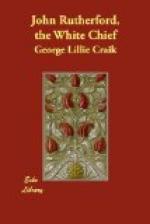[Footnote BG: Pomare.]
[Footnote BH: Te Puna, at that time the principal town in the Bay of Islands.]
[Footnote BI: Rangihoua.]
CHAPTER IX.
The New Zealanders, according to Rutherford, have neither priests, nor places of worship, nor any religion except their superstitious dread of the Atua.
To an uneducated man, coming from a Christian country, the entire absence of all regular religious observances among these savages would very naturally give such an impression. Cook ascertained that they had no “morais"[BJ] or temples, like some of the other tribes of the South Seas; but he met with persons who evidently bore what we should call the priestly character.
The New Zealanders are certainly not without some notions of religion; and, in many particulars, they are a remarkably superstitious people. During the whole course of their lives, the imagined presence of the unseen and supernatural crosses them at every step. What has been already stated respecting the “taboo” may give some idea of how submissive and habitual is their sense of the power of the Divinity, and how entirely they conceive themselves to be in his hands; as well as what a constant and prying superintendence they imagine him to exercise over their conduct.
It would be easy to enumerate many minor superstitions, all indicative of the extraordinary influence of the same belief. They think, for instance, that if they were to allow a fire to be lighted under a shed where there are provisions, their god would kill them.
They have many superstitions, also, with regard to cutting their hair. Cook speaks, in the account of his third voyage, of a young man he had taken on board the ship, who, having one day performed this ceremony, could not be prevailed upon to eat a morsel till night, insisting that the atua would most certainly kill him if he did.
Cruise tells us that Tetoro, on the voyage from Port Jackson, cut the hair of one of his companions, and continued to repeat prayers over him during the whole operation.
Nicholas, having one day found another chief busy in cutting his wife’s hair with a piece of sharp stone, was going to take up the implement after it had been used, but was immediately charged by the chief not to touch it, as the deity of New Zealand would wreak his vengeance on him if he presumed to commit so daring a piece of impiety.
“Laughing at his superstition,” continues Nicholas, “I began to exclaim against its absurdity, but like Tooi, on a former occasion, he retorted by ridiculing our preaching, yet at the same time asking me to sermonize over his wife, as if his object was to have her exorcised; and upon my refusing, he began himself, but could not proceed from involuntary bursts of laughter.”
On this occasion, the chief, when he had cut off the hair, collected it all together, and, carrying it to the outskirts of the town, threw it away. Cook remarks that he used to see quantities of hair tied to the branches of the trees near the villages. It is stated, in a letter from one of the missionaries, that the hair, when cut, is carefully collected, and buried in a secret place.




